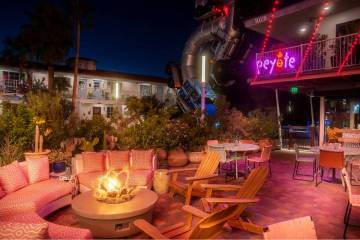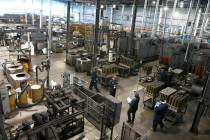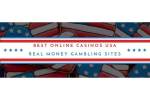Federal panel raises deep concerns about gaming in Macau
WASHINGTON — A federal commission studying U.S. relations with China recommended closer examination of gaming in Macau, saying weak financial controls in the district pose “significant risk” of money laundering and terrorist financing.
The report issued Wednesday by the U.S.-China Economic Security Review Commission stopped short of saying U.S. security interests might be at stake. But commission Chairman William Reinsch said what it found “was disturbing and raises the question that possibility is out there.”
The 12-member panel, composed of experts in trade, intelligence, defense and international affairs, said it “did not seek nor did it find evidence of wrongdoing by any U.S.-based casino company, either in Macau or in Las Vegas.”
But several commissioners suggested that federal oversight or regulation of U.S. gaming companies doing business in Macau might be merited.
The commission recommended the United States press Macau, a special administrative region of China, to fix shortcomings in its financial regulations.
Potential reforms could include a more effective process of freezing assets of suspected criminals, and reducing the high $62,500 threshold for reporting suspicious casino transactions.
The commission was formed in 2000 to make recommendations to Congress on national security and trade issues between the United States and China.
This was the first year in which it examined Macau, and the undertaking appeared to raise red flags with the gaming industry. Macau in 2006 surpassed Las Vegas as the world’s largest gambling market. Its annual, officially reported gross gaming revenue in 2012 of $38 billion was six times that of the Nevada resort city. Experts have guessed the true gaming market could be six times larger than the official estimates.
But rapid inflows of money coupled with Macau’s relatively loose regulations and strict privacy laws present large risks of money laundering, authorities have said. Also the casino industry relies heavily on loosely regulated junket operations that have a history of association with Asian organized crime.
Three Nevada companies, MGM Resorts International, Wynn Resorts Ltd. and Las Vegas Sands Corp., operate some of the three dozen casinos in the booming district. Wynn and MGM made private presentations to the commission about controls and safeguards they have in place to mitigate risks.
At a commission hearing in Washington, D.C., in June, Nevada Gaming Control Board Chairman A.G. Burnett testified that the state believes that Nevada-affiliated casinos in Macau “offer robust compliance with anti-money laundering protocols,” but only to a point where junket operators assume responsibility.
“From our perspective of regulation in this matter, we have limitations,” Burnett said.
Gaming companies weren’t invited to testify. In a written dissent Wednesday, commissioner Robin Cleveland said their lack of input raised questions about the final product’s credibility. As the report was being finalized, MGM Resorts and Wynn Resorts executives requested and were granted a private audience with the commission.
“We have always and will continue to operate with high standards of compliance in meeting government requirements in both Macau and the U.S.,” MGM Resorts spokesman Alan Feldman said.
Gaming leaders said the commission never traveled to Macau during the investigative process.
Geoff Freeman, president and chief executive of the American Gaming Association, panned the report, calling it “incomplete and widely dissented.” He added that the report “was produced without meaningful input” from American companies operating in Macau.
“The Macanese regulatory environment continues to evolve,” he said, “and we are committed to a long-term partnership that enables our companies to thrive and meet the strict regulatory standards of each market in which were are licensed.”
In August, Las Vegas Sands paid a $47.4 million settlement with federal prosecutors to avoid criminal money laundering charges at its Strip hotel-casinos eight years ago. Company spokesman Ron Reese said Wednesday the U.S. Attorney recognized enhancements the company has made to its anti-money laundering program.
“For more than two years, we have consulted with our regulators worldwide as we devoted additional resources and adopted policies to include enhanced due diligence, how we accept money and how we pay out winnings,” Reese said. “We are confident that our anti-money laundering program is designed to detect and prevent money laundering throughout our operations.”
Releasing the report on Capitol Hill on Wednesday, Reinsch said the panel agreed that “this was an area where more work was needed, more investigation was needed.”
It is something the government, both state regulators and the federal government, need to look into in greater detail,” Reinsch said.
Although Reinsch said the commission’s examination of Macau was “fair,” commissioners continued to carry out debate in addendums to the report.
“I do not see the issue of gambling in Macau and the potential legal risk to a few Nevada-based casino companies as a threat to the national security of economy of the United States,” said Larry Wortzel, a retired Army colonel and former director of the Asian Studies Center and vice president of foreign policy at the Heritage Foundation, a conservative think tank.
But three others including former U.S. Sen. James Talent, R-Mo., said it may warrant some level of federal involvement.
“It is our view that the underlying questions about the integrity of operations in Macau bear further scrutiny by Congress,” they wrote in the report. “As part of this review, Congress should examine whether federal oversight and, potentially, regulation of the overseas activities of domestically licensed gaming enterprises is merited.”
“The question for Congress, and federal authorities, is whether U.S. gaming enterprises are being used as venues — knowingly or not — that advance the illegal activities of the Chinese triads.”
In an interview, Talent said, “There is an enormous amount of money laundering going on, whether the American casinos are suffering from it, which is what this thing got caught up in.
“And we don’t know what that money is used for after it is laundered,” he said. “It may be terrorist money. It may be drugs. So there are clearly national security and law enforcement issues at stake, which is why the Treasury Department and the Department of Justice are looking at this all the time.”
Las Vegas Review-Journal reporter Howard Stutz contributed to this report. Contact Stephens Washington Bureau Chief Steve Tetreault at stetreault@stephensmedia.com or 202-783-1760. Follow @STetreaultDC on Twitter.





























